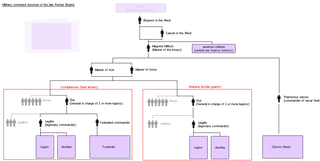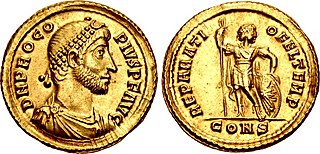Related Research Articles

Valens was Roman emperor from 364 to 378. Following a largely unremarkable military career, he was named co-emperor by his elder brother Valentinian I, who gave him the eastern half of the Roman Empire to rule. In 378, Valens was defeated and killed at the Battle of Adrianople against the invading Goths, which astonished contemporaries and marked the beginning of barbarian encroachment into Roman territory.

Year 366 (CCCLXVI) was a common year starting on Sunday of the Julian calendar. At the time, it was known as the Year of the Consulship of Gratianus and Dagalaifus. The denomination 366 for this year has been used since the early medieval period, when the Anno Domini calendar era became the prevalent method in Europe for naming years.
The 360s decade ran from January 1, 360, to December 31, 369.

Gratian was emperor of the Western Roman Empire from 367 to 383. The eldest son of Valentinian I, Gratian was raised to the rank of Augustus as a child and inherited the West after his father's death in 375. He nominally shared the government with his infant half-brother Valentinian II, who was also acclaimed emperor in Pannonia on Valentinian's death. The East was ruled by his uncle Valens, who was later succeeded by Theodosius I.

Valentinian I, sometimes called Valentinian the Great, was Roman emperor from 364 to 375. He ruled the Western half of the empire, while his brother Valens ruled the East. During his reign, he fought successfully against the Alamanni, Quadi, and Sarmatians, strengthening the border fortifications and conducting campaigns across the Rhine and Danube. His general Theodosius defeated a revolt in Africa and the Great Conspiracy, a coordinated assault on Roman Britain by Picts, Scoti, and Saxons. Valentinian founded the Valentinianic dynasty, with his sons Gratian and Valentinian II succeeding him in the western half of the empire.
Flavius Theodosius, also known as Count Theodosius or Theodosius the Elder, was a senior military officer serving Valentinian I and the western Roman empire during Late Antiquity. Under his command the Roman army defeated numerous threats, incursions, and usurpations. Theodosius was patriarch of the imperial Theodosian dynasty and father of the emperor Theodosius the Great.

Magister militum was a top-level military command used in the later Roman Empire, dating from the reign of Constantine the Great. The term referred to the senior military officer of the empire. In Greek sources, the term is translated either as strategos or as stratelates.

Procopius was a Roman usurper against Valens.

The Theodosian dynasty was a Roman imperial family that produced five Roman emperors during Late Antiquity, reigning over the Roman Empire from 379 to 457. The dynasty's patriarch was Theodosius the Elder, whose son Theodosius the Great was made Roman emperor in 379. Theodosius's two sons both became emperors, while his daughter married Constantius III, producing a daughter that became an empress and a son also became emperor. The dynasty of Theodosius married into, and reigned concurrently with, the ruling Valentinianic dynasty, and was succeeded by the Leonid dynasty with the accession of Leo the Great.

The Valentinianic or Valentinian dynasty was a ruling house of five generations of dynasts, including five Roman emperors during Late Antiquity, lasting nearly a hundred years from the mid fourth to the mid fifth century. They succeeded the Constantinian dynasty and reigned over the Roman Empire from 364 to 392 and from 425 to 455, with an interregnum (392–423), during which the Theodosian dynasty ruled and eventually succeeded them. The Theodosians, who intermarried into the Valentinian house, ruled concurrently in the east after 379.
Flavius Arbitio was a Roman general and Consul who lived in the middle of the 4th century AD.

The Batavi was an auxilia palatina (infantry) unit of the late Roman army, active between the 4th and the 5th century. It was composed by 500 soldiers and was the heir of those ethnic groups that were initially used as auxiliary units of the Roman army and later integrated in the Roman Empire after the Constitutio Antoniniana. Their name was derived from the people of the Batavi.

The Heruli was an auxilia palatina unit of the Late Roman army, active between the 4th and the 5th century. It was composed of 500 soldiers and was the heir of those ethnic groups that were initially used as auxiliary units of the Roman army and later integrated in the Roman Empire after the Constitutio Antoniniana. Their name was derived from the people of the Heruli. In the sources they are usually recorded together with the Batavi, and it is probable the two units fought together. At the beginning of the 5th century two related units are attested, the Heruli seniores in the West and the Heruli iuniores in the East.
Flavius Arintheus was a Roman army officer who started his career as a middle-ranking officer and rose to senior political and military positions. He served the emperors Constantius II, Julian, Jovian and Valens. He was appointed consul in 372 alongside Domitius Modestus.
Victor was a Roman military officer and politician, who served the emperors Constantius II, Julian, Jovian and Valens. He was appointed consul in AD 369, alongside Valentinianus Galates.
Dagalaifus was a Roman army officer of Germanic descent. A pagan, he served as consul in 366. In the year 361, he was appointed by Emperor Julian as comes domesticorum. He accompanied Julian on his march through Illyricum to quell what remained of the government of Constantius II that year. He led a party into Sirmium that arrested the commander of the resisting army, Lucillianus. In the spring of 363, Dagalaifus was part of Julian's ultimately-disastrous invasion of Persia. On June 26, while still campaigning, Julian was killed in a skirmish. Dagalaifus, who had been with the rear guard, played an important role in the election of the next emperor. The council of military officers finally agreed on the new comes domesticorum, Jovian, to succeed Julian. Jovian was a Christian whose father Varronianus had himself once served as comes domesticorum.
Sebastianus was a Roman general who died at the Battle of Adrianople alongside the Emperor Valens during the Gothic War.
Gomoarius was an Alemannic warrior who served in the Roman army.

Flavius Jovinus was a Roman general and consul of the Western Roman Empire. He was of Gallic or Germanic origin and was both born and buried in Durocortorum, modern day Reims.
Lucillianus was a high-ranking Roman army officer and father-in-law of the emperor Jovian. He fought with success in the war against Persia, and played a part in the execution of the emperor Constantius II's cousin, Gallus. In 361, Lucillianus was kidnapped by the emperor Julian and forced into retirement. He was recalled to service after the accession of his son-in-law Jovian in 363, and given a senior military command, only to be murdered that same year by mutinous troops in Gaul.
References
- Seeck, Otto, "Lupicinus 1", Realencyclopädie der classischen Altertumswissenschaft , volume XIII.2, column 1844 (Stuttgart, 1927).
- Lupicinus 6, in The Prosopography of the Later Roman Empire , vol. 1, pp. 520f.